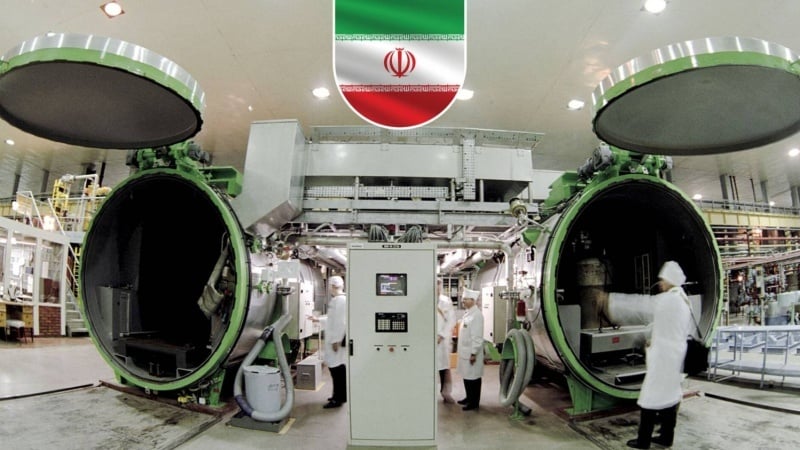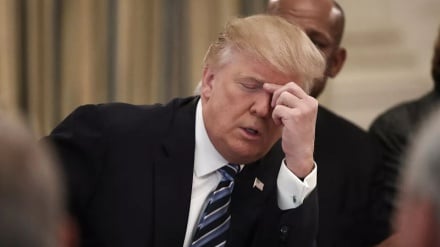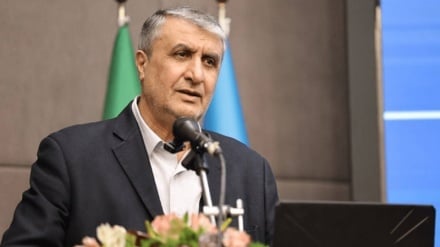Why is uranium enrichment a redline for Iran?
-

Why is uranium enrichment a redline for Iran?
Pars Today- Although Iran's ability in the technology of uranium enrichment and preservation of the cycle of atomic fuel production inside the country is pursued within the framework of peaceful uses and under the supervision of the International Atomic Energy Agency, naturally it creates a sort of "strategic deterrence".
According to Pars Today, the heated discussions about uranium enrichment by Iran during the recent days, which coincided with the ongoing nuclear negotiations, drew many attentions. According to "Avash", enrichment is on top of the Iran-America differences for reaching a final agreement, at least at this phase. It is an important and bold redline which Tehran will never withdraw from. This redline was repeated during the JCPOA, too, although it resulted in the minimum rate of %3.67 enrichment inside Iran.
On the other side, Americans claim that enrichment has no "logic goal" for a country unless it intends to move towards making atomic bomb. Thus, no country without atomic bomb should enjoy such a right and capability. Trump has also just twitted zero level of enrichment for Iran. In such an atmosphere, the question is: Principally, why does Iran need uranium enrichment and why should such an issue become so important for the country to be raised as a redline in the negotiations?
Iran's enrichment capacity an effective diplomatic leverage
Today, it is the high level of science and technology which makes countries pioneers in the world and makes them take the lead in various spheres. Nuclear knowhow is considered as a very important component in this field. Iran relies highly on nuclear-based electricity up to 20,000 megawatt and production of radio-medicines for one million patients during the next two decades. Certainly, with regards to the global conditions and the past experience of maintaining the fuel needed for its reactors and guaranteeing the permanent process of fuel maintenance, which was several times breached by the Western parties, it is a strategic policy in the country that under no circumstances will this process be closed or transferred to out of the country.
This strategic policy has caused Iran to prove enrichment as its legitimate right according to the JCPOA and resolution 2231 and also paragraph 4 of the NPT, despite the 6 UNSC resolutions which were unjustly and illegally imposed on Iran for halting or suspension of enrichment in 2006 and 2013. Therefore, Tehran came to the conclusion that lacking independence in production of atomic fuel would have tough and irreparable consequences for the country. Moreover, Iran's technical and scientific capacity in uranium enrichment, particularly in decreasing or increasing the enrichment level as an effective diplomatic leverage, will strengthen its strategic status in the international talks, and as a legitimate deterring tool, will set the ground for active, resilient and targeted participation in the global security and political affairs.
Iran will even be able to use this tool to reciprocate proportionate, punitive and legal policies vis-à-vis commitment or non-commitment of the opposite parties.
Although Iran's ability in the technology of uranium enrichment and preservation of the nuclear fuel production cycle domestically is pursued within the framework of peaceful uses and under the supervision of the International Atomic Energy Agency, naturally it creates a sort of "strategic deterrence".
Such a strategic deterrence has always caused concern for the opposite parties, especially the regional and trans-regional countries, that any mistake in their calculations will have heavily escalate tension in the field of mechanism for non-proliferation of nuclear weapons.
Totally indigenized knowhow
Uranium enrichment requires to combine advanced sciences and engineering which play a significant role in development of nuclear technology. Nuclear physics in compilation of uranium separation formulae, mechanics engineering in designing and manufacturing centrifuges with high precision, science of substances and metallurgy for producing resistant materials and alloys against environmental conditions and nuclear jettings, engineering of electricity and control with the aim of development of precise control systems, smart sensors, enrichment process automation and vacuum and Nano technology to provide the vacuum and control environment in the Nano scale for enhancement of precision and process output are among these high level sciences and technologies which will grow in the country with uranium enrichment. Furthermore, the growth of these sciences can upgrade hundreds of the related sub-branches so that enrichment will contribute to the growth of other fields.
The point to note in the field of technology is that what Iran has achieved in the field of enrichment is thoroughly native with reliance on its own capabilities. In fact, Iran has succeeded to design and produce the new generation of centrifuges with high efficiency able to compete with the global standards in technology. This has caused the Westerners to kick up a ballyhoo as this much of progress, under cruel sanctions, proves high scientific capacity in the country.
Regional and international prestige
One of the most important outcomes of uranium enrichment in Iran inside the country pertains to the international credit and prestige. As a matter of fact, the Islamic Republic of Iran is the only country in West Asia which, relying on its indigenous knowhow and capability, has attained uranium enrichment at high levels and this has caused high credit for the country. Most of the regional countries, despite enjoying broad financial resources, are still in the preliminary phases of development of nuclear fuel cycle and are fully independent on foreign sides. But, having passed this phase, Iran is known as a country enjoying technological independence in the sensitive nuclear field. According to the NPT, the right to development of nuclear fuel cycle and uranium enrichment for peaceful consumption is a definite and recognized right for all non-nuclear member states. The Islamic Republic, stressing this legal and definite right, has managed to defend political pressures with emphasis on legitimate and documented stances, and has continued its legal activities under the IAEA supervision and fulfilled its commitments much beyond the expectations of the agency.
This approach has turned Iran into a symbol of active defense of the rights of developing nations to enjoy new and advanced technologies. Iran's mastery of uranium enrichment technology and full nuclear fuel cycle has promoted its role as an independent scientific and technological power in the world.
Consequently, uranium enrichment in Iran is not merely a technological measure. but a strategic tool for consolidating national status in the international multipolar system and resistance against technological domineering. In fact, uranium enrichment inside Iran is a "multidimensional and strategic" phenomenon which will both help solve energy problems, and contribute to the country's international credit and deterrence capability; just as the loss of this capability will be worrying.
RM/ME


